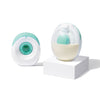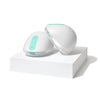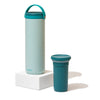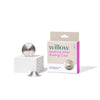There's a "first" for everything in the first year of your baby's life! One of the biggest (and most daunting) firsts is the transition from breast milk to solid food.
Weaning your baby off of breast milk can feel bittersweet, but you're also helping them experiment and discover a whole new world full of nutrition and flavor. In time, your baby will be enjoying the same foods that the family eats at breakfast, lunch and dinner.
If that's hard to imagine right now, no worries, mama. You've got time! In this blog we cover the basics of when and how to introduce your baby to solids. Keep reading to learn more!
Is Your Baby Ready for Solids?
The American Academy of Pediatrics recommends that new mamas exclusive breastfeed up to the 6 month mark. After 6 months, solids can be slowly introduced into the baby's feeding schedule.
While 6 months is the guideline, it's important to remember that all babies start solids at slightly different times. If your baby shows an interest in food, can sit upright, and reaches out when you offer food, chances are they are ready to start trying some solids.
As you plan to introduce your little one to new foods, keep in mind that it is possible to start your baby at the wrong time. Studies show that starting solids too soon may pose a greater risk for developing chronic diseases. Starting too late may cause your baby to be slightly anemic.
Because of this, erring on the side of caution is best when introducing solids to your baby. Wait until they show clear signs of readiness, or until the 6 month mark. If you're unsure, work with your pediatrician to make a plan.
Best Solid Foods for Your Baby
We know feeding your little one is at the top of your mind, especially during the first year. It's important to watch your baby's eating habits, but don't put too much pressure on how much solid food they eat. Let them take the reins as they explore the world of food!
As you introduce your baby to solids, you may consider the baby-led weaning technique. Instead of preparing specific foods for your baby to eat, you're allowing your baby to eat a refined version of what the rest of the family is having for dinner.
This technique can help expose your baby to new types of foods, while teaching them self-regulation and social skills. If you aren't ready for baby-led weaning but want to give your baby some solids to taste, below are some of the best options to give your little one.
Avocado
Avocados are packed with crucial vitamins and minerals, and are incredibly tasty, making them one of the best first solids for babies to try. The best thing about a ripe avocado is that they are soft and mushy, making them easy for babies to eat.
Tip: Mash an avocado with crunchy baby cereal, quinoa, or even breast milk for additional texture and flavor!
Pears
Pears are filled with Vitamin C and fiber, which are vital nutrients to help your baby grow big and strong. The fiber found in pears has also proved to be a prebiotic for babies, which supports immune and digestive health.
Cook, steam, or mash pears and introduce them to your baby in small bites. If your baby is pleased, you can start incorporating the pears into other meals.
Baby Cereal
Baby cereals are often rich with iron, making them one of the most common first solids for babies. Choose an oat or barley based cereal and serve with a mashed up banana for a tasty snack for your little one.
Steamed and Peeled Veggies
Peeling and steaming veggies makes them easier to digest for your baby to enjoy. Carrots, pumpkin, and spinach are all great options for helping your baby get vital nutrients in their first solid bites.
Tip:Create a blended veggie "smoothie" for your baby with tasty steamed veggies. It's an easy way to make a homemade puree!
Solid Foods to Stay Away From
As you introduce solids to your baby, there are certain foods you should avoid. The general guideline is to avoid anything sticky, hard, or small that pose a choking hazard. However, there are some specifics to watch out for:
Honey
Babies should not be fed honey, as it increases their risk for infant botulism. The spores that are associated with botulism are often found in raw honey, which can be dangerous for your baby's growing immune system. There are health benefits to honey, and studies show that infants can try small amounts after 12 months.
Cow's Milk
Babies should not be introduced to cow's milk until after they turn one year old. Cow's milk does not contain the vital nutrients that a baby needs to grow - that's what breast milk is for! Cow milk and other dairy products may also be difficult for babies to digest.
Fruit Juice
Fruit juice is often full of sugar, and does not offer any nutritional benefits for babies under one year old. Drinking juice may also limit your baby's hunger or thirst for breast milk and other nutrients. Once your baby turns one year old, it is OK to give them small amounts in moderation.
4-8 Months: What to Expect
Once you get the go-ahead from your pediatrician, you can begin experimenting with pureed fruits, veggies, and even meats. During this time you can also begin weaning your baby from breast milk. Try one food at a time, and observe how your baby reacts to each taste.
This is a time to help them explore what they like, and what they don't. Within the safe guidelines, help them expand their palette!
8-12 Months: What to Expect
During this time your baby can begin eating more solids like baby cereals, steamed veggies, and gentle grains. You may be pumping or breastfeeding 3-4 times per day, and weaning your baby from night feeding sessions.
12+ Months: What to Expect
After the 12 month mark, your baby should be eating the same foods that the rest of your family is enjoying at meal times. Granted you may need to modify some items to make it easier for them to chew. Try to incorporate iron-rich foods into meal-times to support healthy baby development.

















